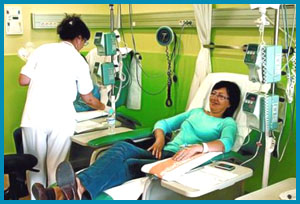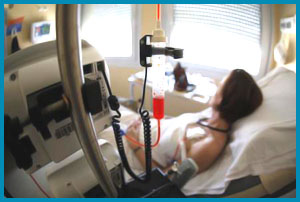| |
| What is Chemotherapy and how does it work ? |
| ----------------------------------------------------------------------------------------------------------------------------------------------------------------------------------------------------------------------- |
| |
|
Chemotherapy is a cancer treatment using drugs that are given intravenously through an injection or by mouth. These drugs destroy cancer cells by impeding their growth and reproduction. Your doctor may recommend chemotherapy alone or in conjunction with radiation therapy or surgery depending on what course your team decides is best.
The downside to chemotherapy is that its side effects can be unpleasant including nausea, vomiting, hair loss and mouth sores. Your doctor will use new and effective approaches to prevent or moderate these side effects to make treatment as painless as possible. In addition to the standard chemotherapy protocols, your doctor continually revises chemotherapy protocols to reflect new and better treatment, including many clinical studies available as treatment options. |
 |
|
| |
| |
| |
| Different types of Chemotherapy : |
| ----------------------------------------------------------------------------------------------------------------------------------------------------------------------------------------------------------------------- |
| |
|
Chemotherapy with these powerful drugs is called standard chemotherapy, traditional chemotherapy, or cytotoxic chemotherapy. |
|
| |
|
Several other types of drugs also treat cancer. Many of the newer drugs are called targeted drugs, because they damage cancer cells by blocking genes or proteins found in the cancer cells. Because these treatments work specifically on the cancer cells, they cause different side effects and usually damage healthy cells less. Other types of cancer therapy include hormones and drugs that work with your immune system to fight cancer. Learn more about targeted therapy and immunotherapy. |
| |
| What to Expect During Chemotherapy : |
| ----------------------------------------------------------------------------------------------------------------------------------------------------------------------------------------------------------------------- |
| |
 |
Chemotherapy treatment protocols can vary widely. Your chemotherapy treatment is designed to fight your cancer by keeping your specific diagnosis, medical history and treatment goals in mind. As such, different patients experience chemotherapy in different ways.
Chemotherapy works by stopping or slowing the growth of cancer cells, which grow and divide quickly. Chemotherapy services include the administration of anti-cancer agents and supportive care drugs used to make the chemotherapy visit less uncomfortable. Chemotherapy, other anti-cancer agents and supportive care drugs may include oral medications such as pills, tablets, capsules, and liquids; slow or rapid intravenous or intra-arterial injections (IV); and injections under the skin (subcutaneous), intramuscular (into the muscle), and into the abdominal cavity (intraperitoneal infusions). Some of the oral medications include anti-hormones, most often given in cases of breast or prostate cancer. Oral chemotherapy is taken at home on a certain schedule. Intravenous medications may take as little as 5 minutes or as long as 4-8 hours to administer and are primarily given in the Cancer Center. The intraperitoneal route is usually much less often for some cases of cancer of the ovary or gastrointestinal system; this procedure may take up to 8 hours. All I.V. medications can be given to you in our clinic as an out-patient which means that no hospitalization is required. |
|
| |
Chemotherapy may be used as the only cancer treatment, but more often you will get chemotherapy along with surgery, radiation therapy or biological therapy. When you receive more than one type of cancer therapy it is called multimodality therapy. A combination of cancer therapies may provide a better chance for cure. |
| |
| Chemotherapy can : |
| |
| • Make a tumor smaller before surgery or radiation therapy; called neo-adjuvant chemotherapy. |
| |
| • Destroy cancer cells that remaining after surgery or radiation therapy; called adjuvant chemotherapy. |
| |
| • Help radiation therapy and biological therapy work better; called potentiating the action of a therapy. |
| |
| • Destroy cancer cells that have come back (recurrent cancer) or spread to other parts of your body (metastatic cancer). |
| |
| |
| |
| Common side effects : |
| ----------------------------------------------------------------------------------------------------------------------------------------------------------------------------------------------------------------------- |
| |
| Different drugs cause different side effects. Certain types of chemotherapy often have specific side effects. But, each person’s experience is different. |
| |
| Tell your doctor about all the side effects you notice. For most types of chemotherapy, side effects do not show how well treatment is working. But they can for some types of drugs called targeted therapies. Learn more about targeted therapy. |
| |
| |
| Common side effects of traditional chemotherapy. |
| |
| Fatigue is feeling tired or exhausted almost all the time. It is the most common side effect of chemotherapy. Learn more about how to cope with fatigue. |
| |
| Pain Chemotherapy sometimes causes pain. This can include : |
| |
- Headaches
- Muscle pain
- Stomach pain
- Pain from nerve damage, such as burning, numbness, or shooting pains, usually in the fingers and toes
|
| |
| Pain usually gets less with time. However, some people have permanent nerve damage. This can cause symptoms for months or years after treatment. |
| |
| Doctors can treat pain by : |
| |
- Treating the source of the pain
- Giving pain-relieving medications
- Blocking pain signals from the nerves to the brain with spinal treatments or nerve blocks
|
| |
| |
| |